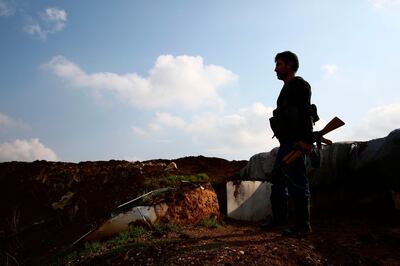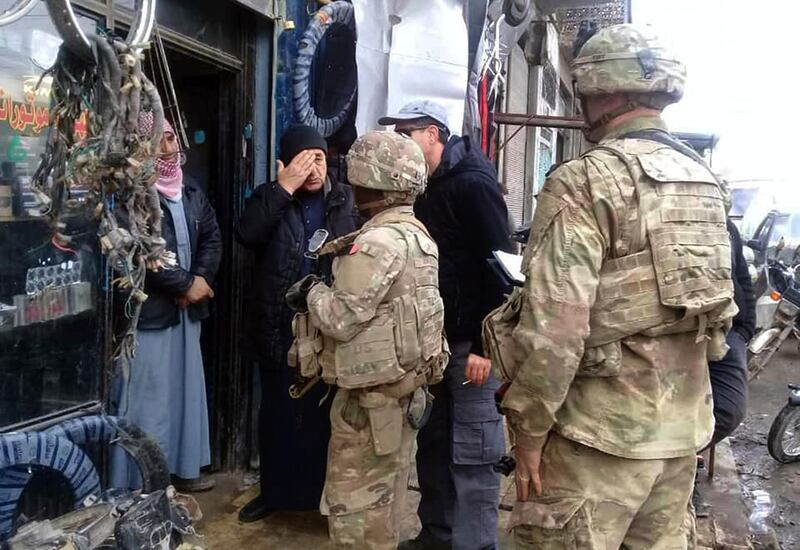Turkish troops are massing along the Syrian border and near Kurdish-held areas in the country’s north days after US President Donald Trump announced a pull-out of American troops.
Meanwhile, Mr Trump tweeted on Sunday that he had "a long and productive call" with Turkish President Recep Tayyip Erdogan, regarding ISIS, mutual involvement in Syria, and the "slow" and "highly coordinated pullout of US troops from the area".
Convoys of tanks, artillery and troops have been crossing the border near the Kurdish-held town of Manbij since Saturday evening.
Turkey warned last month that it would launch an offensive against US-backed Kurdish militias that are fighting ISIS in northern Syria, a move that the Pentagon said would be unacceptable.
But Mr Trump’s shock decision to withdraw his troops, saying ISIS had been defeated, has emboldened Turkey and led to a week of turmoil in Washington, with Defence Secretary Jim Mattis and US envoy to the anti-ISIS coalition Brett McGurk resigning in protest.
Turkey said it would delay its northern Syria offensive after Mr Trump’s decision but now appeared to be preparing for an assault on Manbij.
The town has been a source of friction between the Nato allies. They reached an agreement in June for the Kurdish People’s Protection Units (YPG) militia to leave but Turkey says its implementation has been delayed.
__________
Read More:
[ Veteran diplomat Brett McGurk resigns as US envoy to anti-ISIS coalition ]
[ US Secretary of Defence James Mattis resigns after clashing with Trump ]
[ Donald Trump's withdrawal of troops from Syria is a huge win for Damascus, Moscow and Tehran ]
[ Con Coughlin: The ripples of Moscow's meddling can be seen around the globe ]
__________
The Syrian Observatory for Human Rights said about 30 tanks and other heavy weapons, on tank carriers, rolled over the Jarabulus border crossing early on Saturday.
“They headed for an area near the Sajour River between Jarabulus and Manbij, not far from the front lines where Kurdish fighters of the Manbij Military Council are stationed,” said Rami Abdulrahman, head of the war monitor in Britain.
A convoy including tanks, field guns, pickup trucks with mounted machineguns and buses carrying commandos was heading to the border district of Kilis in the southern province of Hatay, Turkey’s Demiroren News Agency reported.
Some of the equipment and personnel were stationed along the border and some crossed into Syria through Elbeyli district, 45 kilometres north-west of Manbij.
Film from the Turkish broadcaster TRT World showed parts of the convoy entering Syria through the Turkish border town of Karkamis in the south-eastern province of Gaziantep, 35km north of Manbij.
The convoys are crossing into an area controlled by the rebel Free Syrian Army, a Turkish ally, and heading to the front lines of Manbij.

Turkey claims that Syrian Kurdish militias, particularly the YPG, are an offshoot of the Kurdistan Workers’ Party (PKK), which has waged a decades-long insurgency inside Turkey.
Ankara says they are a national security concern as they want to create a sovereign state along Turkey’s southern border, and accuses them of seeking to extend the PKK insurgency.
Mr Erdogan has vowed to dislodge the Kurdish fighters in northern Syria with the help of thousands of Syrian rebel fighters stationed west of the Euphrates River.
Experts and diplomats have warned that the US withdrawal from northern Syria raises the risk of an ISIS resurgence.
On Saturday, the Syrian government sent reinforcements to the eastern province of Deir Ezzor, close to territory controlled by ISIS and along the front with the US-backed and Kurdish-led Syrian Democratic Forces.
The Observatory said the troops and pro-government fighters were on the West bank of the Euphrates, mostly in the towns of Mayadeen and Boukamal.
They included members of the Tiger Force, an elite unit that defeated Syrian rebels and ISIS on several fronts in the past two years.
On Friday, senior Kurdish politician Ilham Ahmed warned in Paris that SDF fighters may have to be moved from the front lines against ISIS to the border with Turkey after Ankara’s threat to attack.
Mr Abdulrahman on Saturday said the Syrian troops were sent for a possible attack on ISIS or to assume control of territory that might abandoned by SDF fighters.
Meanwhile in Washington, Mr Trump made light of Mr McGurk’s resignation, saying he did not know him and calling his departure a “nothing event”.
His decision to leave added to criticism of Mr Trump’s abrupt decision to pull out of Syria, which he announced on Twitter apparently without warning his own defence officials or allies.
“If anybody but your favourite president, Donald J Trump, announced that after decimating ISIS in Syria we were going to bring our troops back home (happy and healthy), that person would be the most popular hero in America,” he complained in another tweet.





